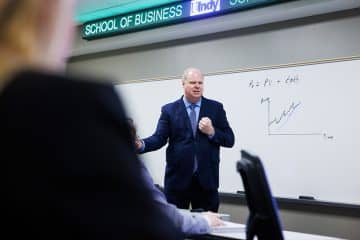5 Steps to Take When You’re Thinking About Going to Grad School
So, you’re thinking about graduate school. It seems like it could be a good idea, but there is a lot to consider before you sign up for any tests or start sending in applications. Before you start looking into schools you may need to determine if graduate school is something you need to pursue at all. Here are five steps you can take to help you decide if Graduate School is right for you:
1. Talk to People Who are Doing What You Want to Do.
Sometimes all you have to do is look at a company’s website or do a search on LinkedIn for a specific job title to see if people have a master’s or doctoral degree. The best way to find out if a particular graduate degree is necessary is to ask someone who is doing the job you want to be doing. Conduct an informational interview, and ask them what they’ve gained from work experience and/or a graduate program. Also ask, if there are upcoming changes in the field that would make them discourage or encourage someone to get a master’s degree in a particular area.
2. Think About Your Career Goals and Get Specific
There is a lot of overlap between graduate degrees with regard to the skills and jobs associated with them. This is why being clear and specific about your career goals will help you immensely with your decision. The better your sense of your career path, the better you can make a decision about which program is right for you.
With this in mind, it may be worth your while to envision your goals. What do you want to do with your degree? Is there one aspect of your chosen subject of study you like better than others? Is there a certain kind of specialty you’re interested in mastering? The answers to these questions will help you narrow down your choices and help you find the grad program that will get you the kind of position you want.
3. Look Beyond Degree Titles
As you begin your search for a grad program, you may find that many degree titles do not really tell you all you need to know about a particular degree. Two schools can offer a degree with the same name with very different curricula or, on the contrary, drastically different degrees can get you hired for the same job. For example, A Chief Financial Officer may have a graduate degree in Finance or an MBA.
The important thing is to know what you want to learn and ultimately do with what you’ve learned. That way, when you look into the finer details of your chosen programs, you can better discern which ones will best fit your criteria. But no matter what you choose, be sure to investigate the program’s curriculum before deciding if it is the right fit.
4. Assess Your Capacity to Take On Graduate Coursework
If you’ve decided that graduate school is your next best step you should assess your capacity to take on the extra work that comes with going back for your Master’s degree. Meaning, given your circumstances, family, current job, finances, commitments, and lifestyle, what kind of student experience is best for you? What circumstances that are in your control might you need to change in order to start a graduate program? Who will you need to ask for emotional, financial, and other kinds of support (i.e. partners, babysitters, parents)? Determining these factors will help you decide what kind of support you’ll need, the student experience you’re looking for, and your timeline for completing your degree.
Are you most interested in a grad program where you can complete all courses online or would you prefer to take courses on-campus after work or on weekends? If you have kids, maybe you can only take one course during the summer term, but 3 in the fall when the kids are in school. (Read: Resources for Working Parents Going Back to School) These are the kinds of considerations that can help you determine where to fit school into your life. Once you have a better idea of the demands on your time and attention, you can judge schools based on the sorts of student services and class formats you’ll require to complete your program.
5. Determine Your Timeline
What is your timeline for searching for starting and finishing your desired program? Remember, you’ll need time to search through schools, prepare for and take any necessary exams, and complete applications. Your current working capacity and strength of your support system may help determine how long those things will take.
Submission deadlines are another important consideration. Some programs have rolling application deadlines depending on when their semester or terms start. It can help to think of when you want to start the program and work backwards from your start date to calculate the time you will need to get all your materials together in time to apply. Common application elements include: personal statements, resumes/CV, 2-4 personal recommendations, and college transcripts. You may also have to take the GRE, which will require study time, testing fees, and limited testing dates.
Once you factor in all these variables, you should be able to get a clearer picture of when you can realistically attend, and how soon you will have to begin preparations.
The graduate school search process may be challenging at times, but earning your Master’s can be highly rewarding as well. Did these steps help you? What step are you on? Are there any we missed? Tell us on social media and share with your friends!
Find an MBA Program that Works for You With Abound
In order to get the most out of an MBA, you want to make sure you enroll in a program that meets your individual needs and allows you to practice your skills and connect with a network of career-boosting professionals. Our MBA database is full of programs that are likely to cater to your interests—check out the schools we believe in and start your path toward an excellent Master’s Degree in Business Administration.
More Helpful Reads:
7 Tips to Help You Balance School and Work
5 Tips for Online Students from an Online Professor
Free Money: Go Back to School on Your Employer’s Dime
How to Improve Your Undergraduate GPA after Graduating College






